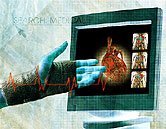Despite lack of evidence, review suggests benefits in terms of engaging and monitoring patients
FRIDAY, Aug. 14, 2015 (HealthDay News) — Mobile health (mHealth) technologies have the potential to improve cardiovascular disease (CVD) prevention in terms of targeting lifestyle behaviors, despite limited evidence on their effectiveness, according to a scientific statement from the American Heart Association (AHA) published online Aug. 13 in Circulation.
Lora E. Burke, Ph.D., from the University of Pittsburgh, and colleagues examined the role of mHealth in CVD prevention in terms of targeting behavior change, cardiovascular risk reduction, and improving cardiovascular health. The authors reviewed 69 studies that used mobile technologies to reduce CVD risk behaviors included in the AHA Life’s Simple 7 program, which addresses seven health behaviors and indicators for cardiovascular health.
According to the statement, the number of apps is increasing at an exponential rate, although their development is not evidence-based. No data were available on engagement by the individual or sustainability of treatment effect. Health apps are offered to the public with limited or no information on accuracy or whether they have undergone effectiveness and safety evaluation. However, mHealth technologies can potentially transform delivery of health-related messages and motivate individuals to engage in behaviors to prevent CVD. Furthermore, mHealth tools for monitoring can exceed what can be measured in brief clinical encounters.
“Clinicians should not conclude that mobile technologies are generally unproven and thus can be ignored,” the authors write. “The current absence of evidence should not be used as evidence of an absence of effectiveness.”
Several authors disclosed financial ties to the pharmaceutical, nutrition, and medical device industries.
Full Text
Copyright © 2015 HealthDay. All rights reserved.








